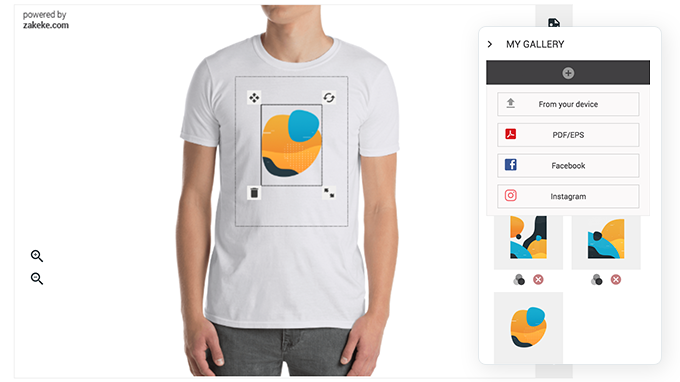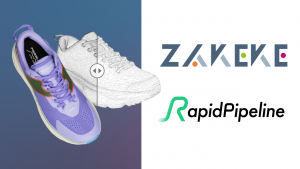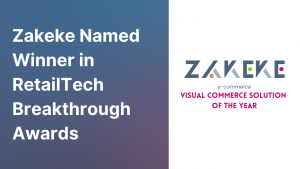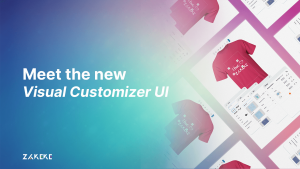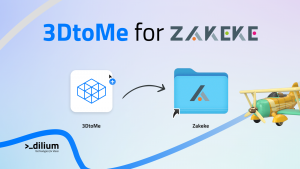Custom merchandising refers to the business strategy where the seller creates customized products to sell to their customers. The business of custom merchandising is booming as more online services and technology becomes available. But being a successful custom merchandiser requires knowledge of other tools, like personalized marketing and search, to reach your customers.
Today, we’ll talk about ways you can use customized products to create a new sales channel and give clients what they want. We’ll also talk a little about how setting up an effective search and using data to sell can help you ensure you give clients what customers really want.
What is custom merchandising
Custom merchandising, also known as personalization according to Gartner, adds relevance to a customer search for a product or service. When we talk about customization in ecommerce, we’re talking about services or products that can be tailored to a customer’s exact requirements or needs (like clothing, etc.)
Part 1: Custom merchandising–providing personalized products customers want
In the past, personalization was confined to a few common situations. A seller with a fast vendor might be able to offer t-shirts, hats or other smaller items if they weren’t too fancy. Sellers, especially smaller businesses, were restricted to a few types of product selections due to warehousing, shipping, and production constraints.
But that was yesterday. With today’s technologies, now just about any product can be customized, even by smaller businesses.
Some challenges of custom merchandising
Right now, custom merchandising of products is being utilized by everyone from the smallest of artisans to large Fortune 500 companies. Today’s technologies, including 2D and 3D printers, third-party warehouse solutions, white label products, tools for automation and design, along with expanded business, marketing and ecommerce options make it easier than ever for sellers to scale their services to customer needs.
For example, here at Zakeke we offer a variety of solutions businesses can use to create their own line of custom-designed products for their customers.
Visuals matter on your custom merchandise website
One problem sellers may encounter with custom merchandising is adequately providing visuals of the finished product. Buyers want to “see” and “feel” what the product will look like when it’s done. Providing a pleasing customer experience, complete with great visuals, is critical if you’re a seller.
As the Bigcommerce website notes, visual commerce is the updated, online shopping version of the brick and mortar buying experience. It leverages your brand’s best visual content with augmented reality to create a new, better online shopping experience for the customer.
To help create the best online experience for customers:
- Use eye-catching visuals to show/communicate to customers what their finished product will look like
- Tell customers what options they have for customization
- Create an easy-to-use website and instructions for customization
Some custom merchandising successes you may have seen already
Nike (custom shoes)
The company has a comprehensive design interface built on their website, even allowing the customer to upload their own designs. In addition to personalized products, Nike’s customization website has a strong product education program, designed to engage and inform customers.
Etsy
One of the largest ecommerce tools for sellers of customized merchandise today may be Etsy. Etsy, a leader in the maker economy, has a robust website that makes it easy for its thousands and thousands of vendors to provide customized merchandise to customers.
(By the way, our SaaS here at Zakeke offers easy integration with Etsy, Shopify, WooCommerce, Salesforce, OpenCart, and BigCommerce in a seamless way.)
MTailor
Another example of a service using custom merchandising as their business model can be found in a New York Times article on MTailor, an online clothier. The company takes advantage of innovative technology to get measurements for their designs. Their tailored clothing, designed to fit each customer’s unique body type, is created using body scans taken by the customer’s cellphone.
Part 2: Custom merchandising–using data and personalization for your sales messaging
But not all business customization involves product design.
When we think about selling customized products, we should also consider marketing to match it: product recommendations given to customers when they search your website, as well as using data to tailor your customer messaging.
Relevant searches matter to customers looking for products
Today, business owners and marketers rely heavily on data to provide better, more personalized shopping experiences. And they should. In fact, 53% of online shoppers believe that personalized shopping experiences are valuable, as long as privacy concerns are met.
Knowing and understanding customer needs is a big part of the personalization picture, and why using data to create customized marketing is vital.
Successfully selling custom merchandising depends heavily on customer searches. As e-commerce provider Bigcommerce notes, customers are now used to robust search engines that narrow in on their needs with the simplest of key phrases; precision search engines that can almost predict what they want. According to other research, when personalization and proprietary customer data are integrated, revenue increases 6% to 10%. Perhaps that’s because those powerful ecommerce search engines really aren’t just guessing, they really know what customers want.
Search is such an important tool for ecommerce that one survey shows that 68% of e-commerce leaders currently plan to make changes to their search engine functionality to get better data from their searches.
Machine learning and search engines
One component of many ecommerce websites is the use of machine learning . Machine learning uses algorithms or programs with access to shoppers’ data, to “learn” your customer needs through pattern recognition. Machine learning allows the search engines of online websites to take that same shopper data to identify trends, provide personalized customer recommendations or results based on the data sets.
Data is your friend if you’re a seller of customized products
Most ecommerce companies offer some form of tailored messaging to customers based on data gathered from previous interactions. As BCG notes, brands that don’t offer personalization in their messaging or product offers will miss out.
As digital marketing website thegood.com points out, customer data gives your business the ability to give customers more relevant choices. This is especially important when it comes to customized products.
- Good data is actionable and can be tested
- Insights from testing can be used to help anticipate future needs
- Analytics from search engines and other customer interactions can be used to help you better understand your customers, how they shop. It can also help you create better product description keywords, and more.
Some examples of personalized messaging campaigns you may have seen
Starbucks
Starbucks, with years of data from customers, is a leader in digital marketing, crafting personalized marketing campaigns using gamification, location-based marketing (GPS), and more.
Disney Resorts
Disney also uses the data it gathers from every online interaction to produce targeted offers for guests.
Customize your own products today with Zakeke
Customization is about giving the customer choices in the products they purchase. We integrate with a variety of ecommerce, fulfillment/logistics, and other business services. So, ready to start your own custom product line?
If you are wondering what you can do with Zakeke, check out our DEMO STORE.
Supported Platforms:
Stay up to date and follow us on LinkedIn, Facebook and Instagram



